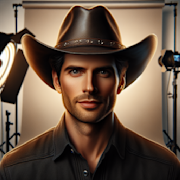The Evolution of Westerns: From Silent Films to Epic Classics

Westerns, a genre that encapsulates the spirit of the American Frontier, have always held a special place in the hearts of moviegoers. From the early days of silent films to the epic classics we know today, westerns have evolved and adapted to reflect the changing times and tastes of audiences. In this blog post, we will explore the fascinating evolution of westerns and the impact they have had on the film industry.
The Birth of Westerns: Silent Films and Early Classics
The western genre had humble beginnings in the early days of cinema, with many silent films laying the groundwork for the expansion of the genre. These early westerns depicted the Wild West with its lawlessness, cowboys, and saloons.
One of the most notable early westerns is “The Great Train Robbery” (1903), a silent film that pioneered many storytelling techniques used in westerns to this day. This film set the stage for future western classics by establishing the thrilling train robbery as an iconic staple of the genre.
The Golden Age of Westerns: From John Wayne to Sergio Leone
The 1940s through the 1960s marked a golden age for westerns. This era saw the rise of legendary actors such as John Wayne, who became synonymous with the genre. Westerns became a mainstay in Hollywood, appealing to audiences craving tales of heroism, justice, and the rugged American Frontier.
During this period, westerns explored a variety of themes and subgenres, from traditional tales of cowboys and outlaws to revisionist westerns that challenged established conventions. Notable classics emerged, such as “High Noon” (1952), a gripping story of a lawman facing a relentless enemy.
In the 1960s, the genre underwent a significant transformation with the arrival of Italian director Sergio Leone, who revolutionized the western with his “Spaghetti Westerns.” These films, such as “A Fistful of Dollars” (1964), introduced a gritty and morally ambiguous tone, reinventing the genre for a new generation of audiences.
Modern Westerns: Blending Traditional Elements with Contemporary Issues
As the film industry evolved, so did the western genre. Modern westerns continued to captivate audiences by blending traditional elements with contemporary issues and themes, making the genre more accessible and relevant to a broader range of viewers.
One standout modern western is “Unforgiven” (1992), directed by Clint Eastwood. This film deconstructed the traditional heroic cowboy archetype and explored the morally ambiguous nature of justice. It garnered critical acclaim, showing that westerns could still be groundbreaking in the modern era.
Another notable example is the Coen Brothers’ “No Country for Old Men” (2007), which combined elements of a modern crime thriller with a western setting. The film masterfully depicted the bleakness and violence of the modern world while staying true to the spirit of the genre.
The Legacy of Westerns and Their Influence on Film
Over the years, westerns have left an indelible mark on the film industry, influencing countless filmmakers and genres beyond their own. The visual storytelling techniques and iconic characters established in westerns continue to shape modern cinema.
Films like Quentin Tarantino’s “Django Unchained” (2012) and “The Revenant” (2015) by Alejandro González Iñárritu are testaments to the lasting appeal and versatility of the western genre. These movies incorporate elements of the classic western while exploring new themes and pushing the boundaries of filmmaking.
Conclusion: A Genre that Stands the Test of Time
From silent films to epic classics, the evolution of westerns showcases the enduring power of a genre that has spanned generations. The ability to adapt to changing times and reflect the evolving aspirations, values, and concerns of society is what keeps westerns relevant and captivating to this day.
Whether celebrating the romanticized image of the cowboy or challenging our perception of justice, westerns continue to transport us to a time and place where the wilderness and human spirit collide. As cinematic technology advances and new storytellers emerge, the future of westerns remains bright, ensuring that this beloved genre will continue to captivate audiences for years to come.

Alberto Miller
Movie Fanatic
More From Classics Authority Movies

Movie
The Grapes of Wrath (1940)

Movie
Beyond the Screen: Unraveling the Enigma of Alfred Hitchcock's Masterpieces

Movie
Shakespeare in Love (1998)

Movie
Screenwriting Giants: The Masters Behind Classic Movie Scripts

Movie
Cinematic Alchemists: Special Effects Wizards Behind Classic Movie Magic

Movie
Underappreciated Gems of Classic Cinema: Hidden Treasures Worth Discovering





